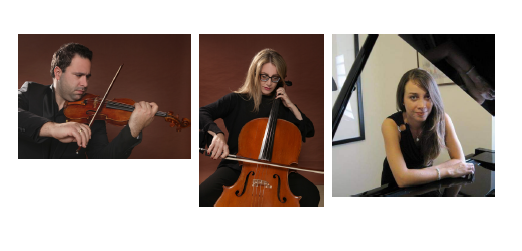Trio Davani

Ave Maria recordatio
Aris Tsigaras
Αισθηματισμός [Sentimentalisme]
Nikos Vichas
Some 50 Years After
Evagoras Karageorgis
Dvorak na Kypru
Marios Christou
Corona Trio
Christodoulos Georgiades
Reggae Connotatios
Michalis Andronikou
1 Those were the prompts: two distinctive themes -Palestrina, Bruckner- for two such distinctive words, words for Her, such an archetype: ever since she was felt, since then endlessly she is being recalled…
Recordatio: none of nine Muses would have exist without the existence of Mnemosyne.
2 I am very sentimental. I cannot help that so I write my sentiments down, I liberate them. They drive me towards my kind of music
3 50 years after the coup d’etat and the Turkish invasion of 1974, politicians tried many unsuccessful attempts for the unification of the island and the finding of a solution. Even though memories, protests and concerns fade, music is always is there to help us hold on and to determine our existence in time and space, while searching what we were, what we are, and where do we go. On the other hand, through the path of music, through the path of art, we can work and coexist as peoples.
4 Dvořák in Cyprus“ is a kind of a spin-off of my earlier composition “Beethoven in Greece” written in 2016. The work was commissioned in 2022 by Trio Bohémo, who approached me with a request to compose for them a piano trio with a touch of Greek style and a sense of humour (like “Beethoven in Greece”). The result is this playful work, based on a fantasy story I have invented, where Antonín Dvořák secretly visits the island of Cyprus. There, in this culturally remote and very exotic place, under the influence of local music, he immerses in a state of ecstasy and writes a composition that combines elements of two very distant worlds: the music world of Antonín Dvořák as we know it and the world of Cyprian folk music. Aware that such a piece would not be embraced in his own era, Dvořák chooses to leave the score in the ancient Cypriot monastery where he spent the night, accompanied by a note, which explains the circumstances of the creation of the piece and the reason why he left the score to its fate. Much later, in the 21st century, the manuscript is discovered by a Cypriot composer that lives in Prague and who, finally, introduces the work to world (but under his name….).
5 During the difficult years of the pandemic, I was like many others stuck at home in isolation. Gone were the concert performances, travels, jury commitments in competitions etc. But I soon realised that this “stay at home” period had something very valuable to offer me: TIME.
Yes, during previous years I did compose even between travelling, but now I had all the time in the world to search & look “within”. So I started reading a lot & with renewed intensity sat down to compose. This Piano Trio is the fruit of that difficult period of isolation, which brought about unexpected results & several new compositions.
Musically speaking this work has “traditional leanings”, as I am a composer who believes in Tonality. Western music has depended on a tonal system which served composers during a long period of 400 years, to actually write their works. And even today, these are the great works we listen to & revere, all based on this important tonal system. I am therefore continuing to respect this system myself, which is rooted in physical & natural laws, & am not tempted to become a disciple of Arnold Schoenberg!
6 Reggae Connotations (2024) – This piece was written after a trip to Jamaica, and it reflects my reception of Reggae’s “hidden” energy and power to connect people.